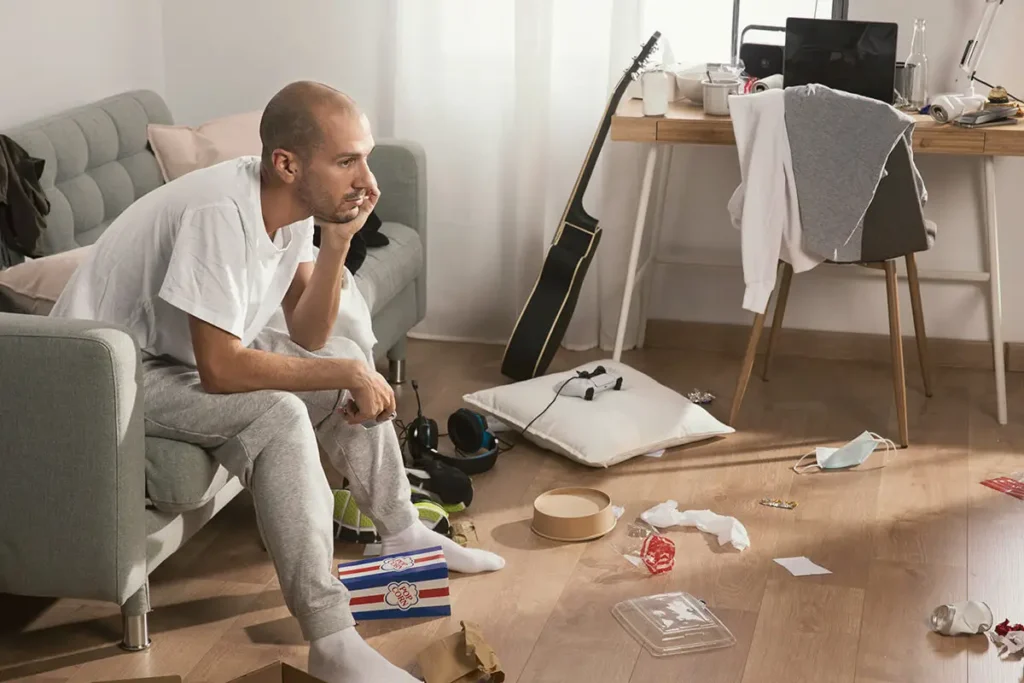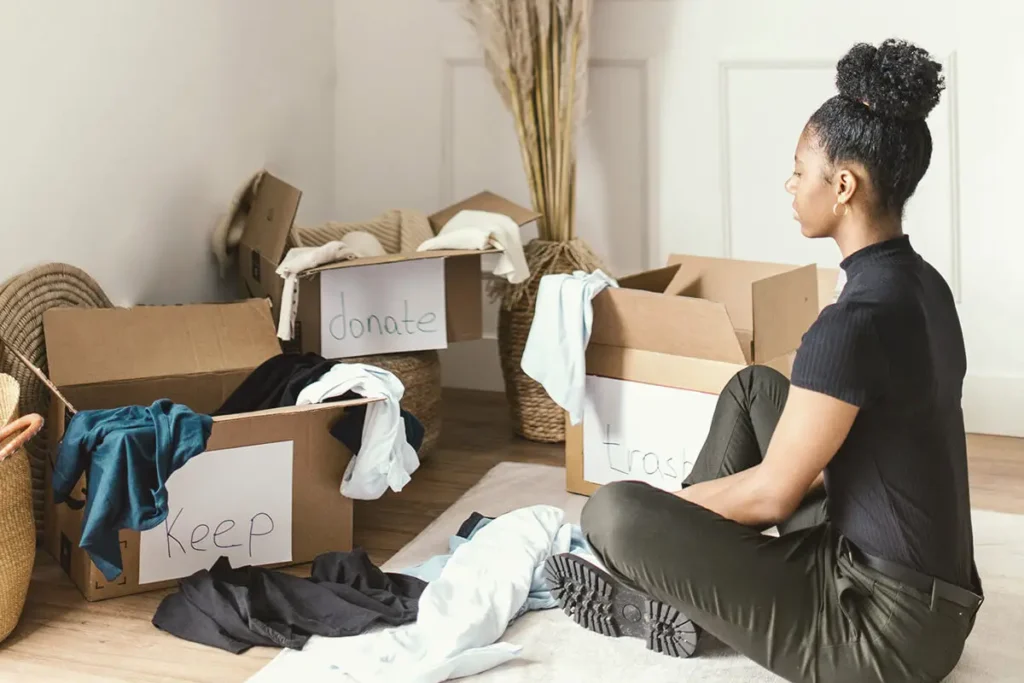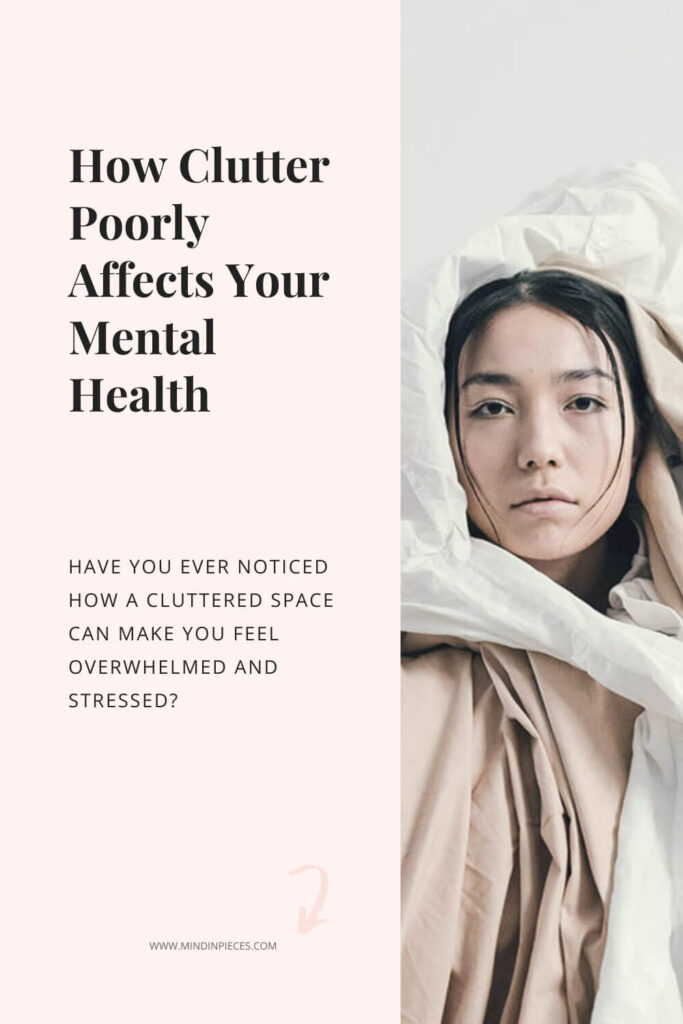Have you ever noticed how a cluttered space can make you feel overwhelmed and stressed? This is because clutter can have a negative impact on us emotionally, physically, and mentally, and in various ways.
Physical, digital, emotional, or mental clutter can affect your mood and ability to think clearly. It can also lead to the development of poor sleep habits, cause stress, and lower your energy levels. It can also affect your productivity and contribute to making poor health choices.
What Is Clutter?
You’ve come across this, right? You know… That pile of laundry in the corner of your bedroom that is becoming larger by the day… What about your living room, scattered with magazines, blankets, and whatever else on every surface–the coffee table, the couch, even the floor? It’s like tackling a little obstacle course to find a spot to relax or walk around!
Well, that’s what we call physical clutter. Clutter isn’t just about our physical belongings–there’s also digital, mental and emotional clutter.
Digital clutter is like having too many files on your devices, making it harder to find what you need and may also slow down the performance of your device. Think about the tens to hundreds of unread emails in your inbox or unorganized photos and videos that you keep telling yourself you’ll attend to–eventually… I’m guilty of this! I feel overwhelmed whenever I see all of the unorganized files that I have gathered in my “To Sort” folder.
Mental clutter is when you have too many thoughts and worries swirling around and unorganized in your head. This can include everything from unfinished tasks and looming deadlines to worries about your future or regrets about the past. It can make it hard to concentrate, make choices, or just feel calm. This clutter can show up as worrying too much, repeating things repeatedly, or obsessive thinking.
Emotional clutter is when we hold on to feelings like guilt, resentment, or unresolved issues. This is commonly known as “emotional baggage” and it can happen when we gather problems that we haven’t yet learned how to deal with, weighing us down and making it hard for us to go about our daily lives.
Overall, clutter can include anything that:
- No longer serves a purpose to you
- Is broken or in need of repair
- Is something you have no motivation to take steps towards sorting out
- Is messy, disorganized, or chaotic
- Has become something that is a challenge to manage
Why is Clutter Unhealthy
When our living spaces are cluttered, it is not only an unpleasant sight but it is something that affects our health.
Our brains go through sensory overload when our surroundings are cluttered. Our brain has to work overtime as it tries to process the clutter we see around us or what is swirling around in our minds. This can overwhelm our nervous system making us feel stressed, anxious, and irritable.
Our immune system can weaken if we live with chronic stress. It can mess up our sleep habits, and, according to SciMedCentral, it can also make it more likely for us to develop conditions like anxiety and depression.
Clutter can also make us feel overwhelmed and frustrated and make it hard for us to relax and unwind. Living in a cluttered environment can be chaotic and make it harder for us to switch off our brains and get enough sleep to feel re-energized. Not getting enough sleep leaves us feeling groggy and irritable the next day.
Even though clutter may seem harmless, it can affect our mental, emotional, and physical well-being.
When Clutter Affects Your Mental Health
Sometimes clutter sneaks up on us and starts to impact our mental well-being without us even realizing it. This can happen when we’re juggling a busy schedule, dealing with unresolved emotions, or when we simply have too much on our plates.
What Causes Mental Clutter
Sometimes clutter can sneak up on us and start to affect our mental well-being without us even realizing it. This can happen when we’re juggling a busy schedule, dealing with unresolved emotions, or when we simply have too much on our plates. Managing mental clutter can be harder for people who are already living with a mental illness like anxiety, schizophrenia, or Attention Deficit Hyperactivity Disorder (ADHD).
Mental clutter can be caused by a variety of factors, including a packed schedule that leaves little time for rest, unresolved emotions from past experiences, or simply feeling overwhelmed by the demands of daily life.
Signs of a Cluttered Mind
- Finding it hard to concentrate or stay focused
- Forgetfulness or absent-mindedness
- Racing thoughts or constant mental chatter
- Feeling overwhelmed by even small decisions or tasks
- Struggling to organize thoughts or ideas
- Putting off tasks or having trouble getting started
- Increased stress, anxiety, or irritability
- Trouble sleeping because your mind won’t quiet down
- Feeling mentally exhausted or drained
- Having trouble finding calm or clarity in your thoughts
Positive Effects of Keeping Tidy
It is important for us to keep our living spaces neat and organized so that we can maintain our well-being. When our environments are clean and organized, it can promote a sense of calmness, clarity, and control. It makes it easier for us to focus on the task at hand and feel more at peace overall. We can create space for things that truly bring us happiness and fulfillment by decluttering our living spaces and saying goodbye to the things we no longer need or that don’t uplift us anymore.
How to Clean Up Clutter
It is important to understand how our cluttered environment affects our mental health so we can take steps to declutter and create a space that boosts our overall well-being. By decluttering our living spaces and creating more organized environments, we can lower our levels of stress, improve our focus and productivity, and develop better sleep habits. It may even help us to have a clutter-free mind, too.
Tips for Decluttering and Organizing Your Home
Before you start organizing, make sure you’ve eaten (if it is close to mealtime) and have a bottle of water at hand.
You can stay organized and feel accomplished by using a checklist. You can find a free printable list that I created for you further down this post.
Start small and tackle one area at a time. Start from one point in that room and work your way around the room in a clockwise direction so you don’t get overwhelmed with deciding where to start. If you find that you’re feeling distracted or overwhelmed, take a break and have a drink of water, maybe a snack, and when you’re ready, continue where you left off. It can be easy to quit, but don’t give up–it takes time.
Use bags or bins in each room to organize items that you will donate, keep, and throw away or recycle. Don’t be afraid to let go of what no longer brings joy.
Once you have gone through all the areas of your home, you can then organize the items in your “keep” bin into their rightful spaces. You can always come back to your keep pile later on if you don’t get to sort them out in the time you had initially designated.
The goal of decluttering should not be about creating a perfect space but rather one that takes care of your mental well-being.
Free Decluttering Printable Checklist to Get You Started
Knowing where to start organizing your home is one of the hardest things to do when decluttering a space. I find that having a checklist when organizing things myself is a good tool to keep me focused and feel like I’ve made progress.
To help you jumpstart and be on top of things during your decluttering and organizing journey, I have created a free printable of an ultimate decluttering checklist that you can download below.
The Bottom Line: Mind Over Mess
While clutter might seem harmless, it surely can affect us in many ways. Knowing what clutter is and what steps we can take to declutter, we can create environments that promote calmness, productivity, and overall well-being.
Happy decluttering! Remember, it’s not about achieving perfection–it’s about moving forward and creating a space that makes you feel good. Your mental health will thank you!
How do you manage to stay organized and minimize clutter in your life?
References
- Why Household Mess Triggers Stress and Anxiety – Neuroscience News
- Chronic Stress Leads to Anxiety and Depression – SciMedCentral
Save This Post for Later
Pin this blog post by saving the image below to Pinterest so you can revisit it whenever you want!








